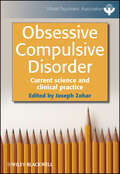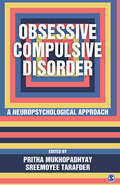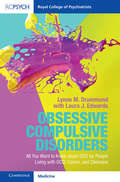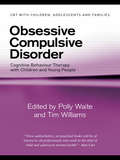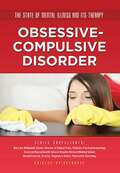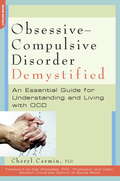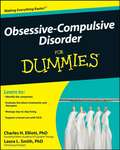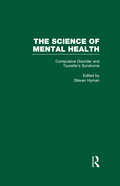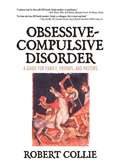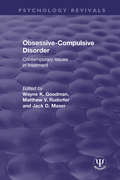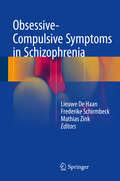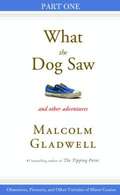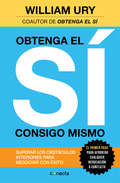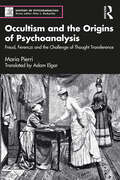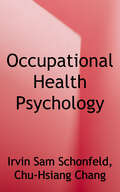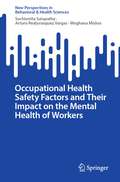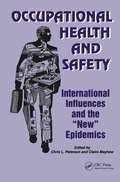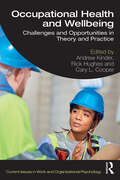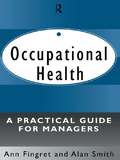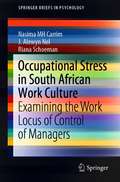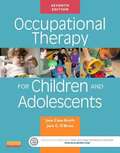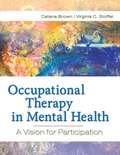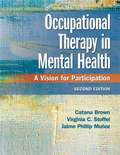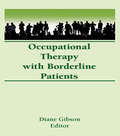- Table View
- List View
Obsessive Compulsive Disorder
by Joseph ZoharA clear summary of what is known about a highly prevalent and debilitating disorder that affects nearly as many people as does asthma. Expert authors review the biological basis for the disorder and describe both pharmacological and psychological approaches to treatment.
Obsessive Compulsive Disorder: A Neuropsychological Approach
by Pritha Mukhopadhyay Sreemoyee TarafderThis edited book is a comprehensive presentation of Obsessive Compulsive Disorder (OCD) through a neuropsychological framework and the various empirical researches carried out in this domain. The book evaluates whether the information from different research perspectives can form a strong basis for improving the available treatment options for OCD as well as devising newer and better therapy strategies. It thoroughly discusses the various neuropsychological assessment tools that can be used to study the different dimensions of OCD in terms of symptom severity, beliefs, personality and cognition, including executive functions. The book provides guidelines to enhance the skills necessary for developing clinical acumen. The distorted beliefs and functioning, familial factors and scope for inheriting the disorder and obsessive–compulsive spectrum are also described in detail. The book concludes with a discussion of obsessive–compulsive personality traits to help readers arrive at a holistic understanding of OCD, combining neuropsychological and psychoanalytical lenses.
Obsessive Compulsive Disorder: All You Want to Know about OCD for People Living with OCD, Carers, and Clinicians (Royal College of Psychiatrists)
by Lynne M. Drummond Laura J. EdwardsObsessive compulsive disorder affects between 1 and 3 per cent of the population. Ranging from relatively mild symptoms to being a profoundly disabling disorder, it is a condition that is amenable to modern treatments. This book examines the evidence for and potential role of a range of treatment methods, from CBT to pharmacological approaches. It asks what an individual can do to help themselves, and how friends and relatives can assist in the recovery process. Although firmly based in clinical research, it is written in a jargon-free and accessible style to help provide deep understanding of the disorder. Personal narratives and case studies of people living with OCD feature to illustrate points, and the book considers emerging research and the future of approaches to OCD. Built upon decades of experience, this guide will inform and support adults and young people living with OCD, as well as carers, families and health professionals.
Obsessive Compulsive Disorder: Cognitive Behaviour Therapy with Children and Young People (CBT with Children, Adolescents and Families)
by Tim Williams Polly WaiteObsessive Compulsive Disorder (OCD) is characterised by a person's obsessive, distressing, intrusive thoughts and their related compulsions. It affects an estimated one percent of teenagers and has been detected in children as young as three years old. In this concise, accessible book experienced contributors provide detailed guidance on carrying out assessments and treatment for children and young people with OCD from a cognitive behavioural perspective. This approach has been developed from extensive research and clinical work with young people with OCD and associated problems. The book includes: an overview of OCD an introduction to CBT and its relevance to OCD in young people assessment and treatment methods case studies and clinical vignettes worksheets for use with the client. This straightforward text provides essential direction for practitioners and trainees in a range of professions including psychiatry, psychotherapy, counselling, nursing, education and social work. Online resources: The appendices of this book provide worksheets that can be downloaded free of charge to purchasers of the print version. Please visit the website to find out more about this facility.
Obsessive-Compulsive Disorder (The State of Mental Illness and Its Ther)
by Shirley BrinkerhoffA century ago, people with symptoms of obsessive-compulsive disorder (OCD) were sometimes institutionalized for life or treated with frightening operations such as frontal lobotomies. In the twentieth century, psychoanalysis and other types of therapies began to offer more treatment options. In this book, you will read about: *Lauren, a high school student whose OCD robbed her of friends, her social life, job, and future, leaving her too ashamed to reach out for help. *Jacob, an eight-year-old who suffered a head injury and awoke from his coma with an all-consuming need to do everything seven times. *Sal, a dependable, well-balanced husband and father whose sudden compulsion to bring home paper and trash changed his entire life. *Laura, whose undiagnosed OCD led her to be placed in a school for children with mental retardation. *Emma, whose frightening thoughts about hurting her baby sister drove her to pray for hours every day and to go to confession many times a week. *Annaliese, a nurse who was accidentally poked by a patient's needle a decade ago and has remained convinced ever since that she has AIDS. Through these stories and the factual material accompanying them, you will learn about the huge ramifications OCD has on individuals' lives as well as the types of treatments available to help. With the discovery of psychiatric drugs, doctors now have more ways than ever to treat, and in some cases altogether relieve, the symptoms of obsessive-compulsive disorder. Obsessive-Compulsive Disorder explains how psychiatric drugs and other forms of therapy are making a difference in the lives of many people with symptoms of OCD.
Obsessive-Compulsive Disorder Demystified: An Essential Guide for Understanding and Living with OCD
by Cheryl CarminAn invaluable guide for anyone with OCD, by a leading expert and with insight from a patient-advocate?an important addition to the popular Demystified series
Obsessive-Compulsive Disorder For Dummies
by Laura L. Smith Charles H. ElliottArguably one of the most complex emotional disorders, Obsessive Compulsive Disorder is surprisingly common. Furthermore, most people at some time in their lives exhibit a smattering of OCD-like symptoms.Obsessive Compulsive Disorder For Dummies sorts out the otherwise curious and confusing world of obsessive compulsive disorder. Engaging and comprehensive, it explains the causes of OCD and describes the rainbow of OCD symptoms. The book shows readers whether OCD symptoms represent normal and trivial concerns (for example, a neat freak) or something that should be checked out by a mental health professional (for example, needing to wash hands so often that they become raw and red). In easy to understand steps, the authors lay out the latest treatments that have been proven to work for this disorder, and provide practical and real tools for living well long-term. Whether you or someone you care about has this disorder, Obsessive Compulsive Disorder For Dummies gives you an empathic understanding of this fascinating yet treatable mental disorder.
Obsessive-Compulsive Disorder and Tourette's Syndrome: The Science of Mental Health
by Steven HymanFirst published in 2002. Obsessive-compulsive disorder (OCD) and Tourette's syndrome (TS) are treated together in this volume because symptoms of each often co-occur and because there are substantial overlaps in genetic risks and possibly in the neurobiology underlying these disorders.
Obsessive-Compulsive Disorder: A Guide for Family, Friends, and Pastors
by Robert CollieExamine the fourth largest mental health problem in America-OCD-and how YOU can help!Since obsessive-compulsive disorder affects 2.5% of the world population, someone you know is likely to have this disorder. Obsessive-Compulsive Disorder: A Guide for Family, Friends, and Pastors is a handy "physician's assistant" that not only provides a fresh overview of OCD but also focuses on the issue of scrupulosity-obsessive-compulsive anxiety over scruples in self and others-as a religious issue. Written by a pastoral counselor who is also a clinical social worker, this book will help you gain insight into the psychological and neurological dimensions of the disorder, the problems of those suffering from OCD, and the development of support groups. Written with extensive knowledge and deep compassion, Obsessive-Compulsive Disorder: A Guide for Family, Friends, and Pastors presents the latest information available on OCD and its effects upon sufferers and their personal relationships. The information is discussed in both pastoral as well as therapeutic aspects, explaining OCD in the brain, then continuing with ways to help a sufferer manage the conflict. Special attention is paid to the issue of scrupulosity-"seeing sin where there is no sin"-which is especially symptomatic for many Roman Catholics, Orthodox Jews, and Orthodox Muslims. Filled with insightful case studies and a useful bibliography, this book helps you understand OCD from all sides while giving effective strategies for individual and group therapy. In Obsessive-Compulsive Disorder: A Guide for Family, Friends, and Pastors you will find: answers to the most frequently asked questions detailed explanations of terms insightful information on pastoral caring an in-depth exploration of scrupulosity helpful information on trichotillomania (hair pulling), kleptomania (stealing), Tourette&’s syndrome, body dysmorphoric disorder (hatred of a particular body part), and hypochondriasis case studies highlighting personal and relationship issues resources for developing support groups resources for further information on OCD A Guide for Family, Friends, and Pastors is for pastors, pastoral counselors, chaplains, lay ministries, social workers, psychiatric nurses, marriage counselors, and for anyone who cares about someone with OCD.
Obsessive-Compulsive Disorder: Contemporary Issues in Treatment (Psychology Revivals #37-3)
by Wayne K. Goodman Matthew V. Rudorfer Jack D. MaserObsessive-compulsive disorder is now recognized to be a serious and chronic illness affecting more than 2% of the population. While the last decade of the twentieth century witnessed many advances on both the pharmacological and the behavioral fronts, fewer than 50% of cases benefitted significantly from treatments available at the time. In this volume, originally published in 2000, leading authorities offer a comprehensive, cutting-edge overview of etiology, diagnosis, assessment, and the latest cognitive-behavioral, biological, and combined approaches to intervention. A special focus is treatment-resistant illness. Obsessive-Compulsive Disorder: Contemporary Issues in Treatment will be an indispensable resource for all professionals who seek better solutions to the often seemingly intractable problems of their OCD clients.
Obsessive-Compulsive Symptoms in Schizophrenia
by Lieuwe De Haan Frederike Schirmbeck Mathias ZinkThis book summarizes scientific advances in our understanding of the interrelationship between obsessive-compulsive symptoms and schizophrenia and reflects on the implications for future research directions. In addition, guidelines are provided on practical assessment, diagnosis and treatment interventions, covering both pharmacotherapy and psychotherapy. The book acknowledges the need for a perspective that recognizes heterogeneous subgroups and diverse neurobiological explanations; accordingly, multidimensional research-based conceptual frameworks are provided that incorporate recent epidemiological, neurocognitive, neurogenetic and pharmacodynamic findings. Obsessive-Compulsive Symptoms in Schizophrenia has been written by an international team of experts who offer insights gained through their extensive experience. It will be an invaluable guide to this frequent and clinically important comorbidity and will be particularly useful for mental health practitioners.
Obsessives, Pioneers, and Other Varieties of Minor Genius: Part One from What the Dog Saw
by Malcolm GladwellWhat is the difference between choking and panicking? Why are there dozens of varieties of mustard-but only one variety of ketchup? What do football players teach us about how to hire teachers? What does hair dye tell us about the history of the 20 th century? In the past decade, Malcolm Gladwell has written three books that have radically changed how we understand our world and ourselves:The Tipping Point;Blink; andOutliers.Now, inWhat the Dog Saw, he brings together, for the first time, the best of his writing fromTheNew Yorkerover the same period. Here is the bittersweet tale of the inventor of the birth control pill, and the dazzling inventions of the pasta sauce pioneer Howard Moscowitz. Gladwell sits with Ron Popeil, the king of the American kitchen, as he sells rotisserie ovens, and divines the secrets of Cesar Millan, the "dog whisperer" who can calm savage animals with the touch of his hand. He explores intelligence tests and ethnic profiling and "hindsight bias" and why it was that everyone in Silicon Valley once tripped over themselves to hire the same college graduate. "Good writing," Gladwell says in his preface, "does not succeed or fail on the strength of its ability to persuade. It succeeds or fails on the strength of its ability to engage you, to make you think, to give you a glimpse into someone else's head."What the Dog Sawis yet another example of the buoyant spirit and unflagging curiosity that have made Malcolm Gladwell our most brilliant investigator of the hidden extraordinary.
Obtenga el sí consigo mismo: Superar los obstáculos interiores para negociar con éxito
by William UryEl primer paso para afrontar cualquier negociación o conflicto. William Ury, coautor del clásico best seller Obtenga el sí, ha enseñado a decenas de miles de personas de todos los ámbitos profesionales cómo mejorar su capacidad de negociación. A lo largo de estos años, Ury ha descubierto que el mayor obstáculo para alcanzar unos acuerdos provechosos y unas relaciones satisfactorias no está en nuestra contraparte, por difícil que esta resulte. El mayor obstáculo reside en nosotros mismos, en nuestra tendencia natural a reaccionar de una forma contraria a nuestros intereses. Sin embargo, este obstáculo se puede convertir en nuestro mejor aliado. Si aprendemos primero a comprendernos y a controlarnos, estamos poniendo la base para comprender e influenciar a los demás. En esta precuela indispensable de Obtenga el sí, Ury parte de su experiencia personal y profesional como negociador en conflictos bélicos paradesarrollar un método práctico que permite conquistar primero el sí con uno mismo, e incrementar de esta forma la capacidad para conseguir el sí de los demás. Útil y sencillo, Obtenga el sí consigo mismo es una guía esencial para alcanzar la satisfacción interior, a partir de la cual podrá mantener unas relaciones más sanas, una familia más feliz, un trabajo más productivo y un entorno más pacífico. Reseñas:«Inteligente y realista, noble y práctico, brillante y cercano. Ury ha desarrollado un planteamiento global para alcanzar el sí en un mundo tan conflictivo como el nuestro. Este libro se centra en la negociación más dura de todas: la que hacemos con nosotros mismos. Una vez más, Ury ha realizado una gran contribución con su trabajo.»Jim Collins, autor de Empresas que sobresalen «He aquí nuestro peor enemigo en cualquier mesa de negociación: nosotros mismos. Ury ha escrito una imprescindible precuela de Consiga el sí. Si usted adopta las estrategias de este libro conseguirá avanzar en su vida y en su carrera.»Daniel H. Pink, autor de La sorprendente verdad sobre qué nos motiva «Ury nos ofrece un planteamiento que refuerza nuestra confianza y que nos aporta una sensación de energía y realización personal. Todos seremos más eficaces si empezamos las negociaciones por nosotros mismos antes que con los demás.»Joanna Barsh, directora emérita de McKinsey & Company
Occultism and the Origins of Psychoanalysis: Freud, Ferenczi and the Challenge of Thought Transference (History of Psychoanalysis)
by Maria PierriOccultism and the Origins of Psychoanalysis traces the origins of key psychoanalytic ideas back to their roots in hypnosis and the occult. Maria Pierri follows Freud’s early interest in "thought-transmission," now known as telepathy. Freud’s private investigations led to discussions with other leading figures like Carl Jung and Sándor Ferenczi, with whom he held a "dialogue of the unconsciouses." Freud’s and Ferenczi’s work assessed how fortune tellers could read the past from a client, inspiring their investigations into countertransference, the analytic relationship, unconscious communication, and mother-infant relationality. Both Freud and Ferenczi tried in different ways to come close to understanding the infant’s occult link with the mother and their secret primal language: their research on thought transference may be identified as a matrix of the developments of current psychoanalysis. Pierri clearly links modern psychoanalytic practice with Freud’s interests in the occult using primary sources, some of which have never previously been published in English. Occultism and the Origins of Psychoanalysis will be of great interest to psychoanalysts in practice and in training, as well as academics and scholars of Freudian ideas, psychoanalytic theory, the history of psychology, and the occult. It is complemented by Sigmund Freud and The Forsyth Case: Coincidences and Thought-Transmission in Psychoanalysis.
Occupational Biomechanics
by Gunnar Andersson Don Chaffin Bernard MartinWith critical applications in manufacturing, transportation, defense, security, environmental safety and occupational health, and other industries, the field of occupational biomechanics is more central to industrial design than ever before. This latest edition of the popular and widely adopted Occupational Biomechanics provides the foundations and tools to assemble and evaluate biomechanical processes as they apply to today's changing industries, with emphasis on improving overall work efficiency and preventing work-related injuries. The book expertly weaves engineering and medical information from diverse sources and provides a coherent treatment of the biomechanical principles underlying the well-designed and ergonomically sound workplace.
Occupational Health Psychology
by Irvin Schonfeld Chu-Hsiang ChangThis comprehensive text for advanced undergraduate and graduate occupational health psychology (OHP) survey courses draws from the domains of psychology, public health, preventive medicine, nursing, industrial engineering, law, and epidemiology to focus on the theory and practice of protecting and promoting the health, well-being, and safety of individuals in the workplace and improving the quality of work life. <p><p>The book will also appeal to anyone who is concerned with the corrosive effects of job stress. The text addresses key psychosocial work issues that are often related to mental and physical health problems, including psychological distress, burnout, depression, accidental injury, obesity, and cardiovascular disease. It examines leadership styles as they impact organizational culture and provides specific recommendations for reducing employee-related stress through improved leader practices. Also addressed is the relationship between adverse psychosocial working conditions and harmful health behaviors, along with interventions aimed at improving the work environment and maximizing effectiveness. Additionally, the book discusses how scientists and practitioners in OHP conduct research and other important concerns such as workplace violence, work and life balance, and safety. The book reinforces learning with key concepts and findings, highlight tables containing intriguing examples of research and current controversies, and chapter summaries.
Occupational Health Safety Factors and Their Impact on the Mental Health of Workers (New Perspectives in Behavioral & Health Sciences)
by Arturo Realyvásquez Vargas Suchismita Satapathy Meghana MishraThis book is about occupational health and safety in the workplace. Work-related productivity has been decreasing in most of the labor-intensive sectors on account of the fatigue and discomfort in workplaces, which is the most significant factor for consideration at all levels. Moreover, improper workplace design leads to most of the occupational accidents as well as injuries in production sites. This book explores discomfort in working environments and its impact on mental health in varying workplaces. It then offers some innovative solutions to provide comfort, safety, and sustainability in workplaces to reduce mental workload.
Occupational Health and Safety: International Influences and the New Epidemics (Policy, Politics, Health and Medicine Series)
by Chris Peterson Claire MayhewThis text provides a theoretical and empirical approach to investigating the nature of emerging OSH (Occupational Health and Safety) epidemics across the industrialized world. The author of each chapter in this book deals with exposure to a particular OSH hazard and examines the epidemic nature of the resulting ill-health or injury outcome. The authors also evaluate the contribution of globalization and neoliberal policies in creating workplace environments which foster such new OSH epidemics.
Occupational Health and Wellbeing: Challenges and Opportunities in Theory and Practice (Current Issues In Work And Organizational Psychology Ser.)
by Cary Cooper Rick Hughes Andrew KinderThis book bridges the gap between theory and practice, incorporating real-world case studies to show how organisations and leaders can adapt after the global unrest and uncertainty caused by the COVID-19 pandemic and more recent challenges. Drawing from expert opinions across the world to highlight the current challenges and opportunities within this sector, it explores how these ideas can be effectively applied within the workplace. The book covers a wealth of topical and relevant themes that include defining wellbeing in a modern world, toxic leadership, mental health first aid, the application of positive psychology, and what the ‘new normal’ might look like. Together, these contributions offer a rich look into how Occupational Health and Wellbeing practices have developed, struggled and thrived. The COVID-19 pandemic forced many organisations to adapt fast and became the most significant accelerator in recent times for embracing, enhancing and improving employee health and wellbeing. Understanding this, the book demonstrates how Occupational Health and Wellbeing continues to rise on the corporate agenda as a key contributor to employee satisfaction, engagement and retention, increased financial stability and overall organisational success. The book is essential reading for senior executives, leaders and professionals involved in occupational health, human resources, health, safety and wellbeing, people support, people development, employee assistance, counselling as well as students within organisational and occupational psychology.
Occupational Health: A Practical Guide for Managers
by Alan Smith Dr. Ann FingretNew legislation and recommended working practices demand that every organisation considers carefully the health of its workforce. Occupational Health: A Practical Guide for Managers offers a comprehensive view of health and safety issues at work. The range of people it aims to appeal to reflects the interdisciplinary nature of this subject. Personnel professionals, managers and occupational health practitioners alike will find it an invaluable resource.
Occupational Stress in South African Work Culture: Examining the Work Locus of Control of Managers (SpringerBriefs in Psychology)
by Nasima MH Carrim J. Alewyn Nel Riana SchoemanThis book explores avenues for organisations to better understand the origins of occupational stress so as to enable their managerial employees to effectively manage stress levels. By way of the work locus of control as a personality variable, the book identifies stressors both within and outside the organisation that underpin high stress levels in organisational culture. In grappling with what is required in the new workforce of ‘Generation Y’ millennials in a hyper-networked and mobile age, the authors present examples from everyday professional situations in South Africa to contribute to critical understanding of today’s working world. By applying neuroscientific principles developed from a foundation of empirical research, the authors introduce the concepts of a 'red zone’ and ‘blue zone' to explain differences between the brain areas controlled either by its stem-limbic areas, or the limbic-cortical cortex areas, respectively. This becomes a psychological shorthand for describing and applying knowledge to encourage practitioners in leadership and management roles to achieve desired behaviour outcomes, and to establish a framework for understanding employee values and worldviews. The book is relevant to practitioners, postgraduate students and researchers interested in industrial psychology, personality psychology, business management and human resources.
Occupational Therapy For Children And Adolescents
by Jane Case-Smith Jane O'BrienThe sixth edition of Occupational Therapy for Children maintains its focus on children from infancy to adolescence and gives comprehensive coverage of both conditions and treatment techniques in all settings. Inside you'll discover new author contributions, new research and theories, new techniques, and current trends to keep you in step with the changes in pediatric OT practice. This edition provides an even stronger focus on evidence-based practice with the addition of key research notes and explanations of the evidentiary basis for specific interventions.
Occupational Therapy In Mental Health: A Vision For Participation
by Catana Brown Virginia C. Stoffel Jaime Phillip MunozThis Client-centered, recovery-oriented text gives voice to the lived experience of mental illness across the life span. You will be guided through the assessment and interventions of individuals with mental health conditions and those whose life circumstances generate significant challenges to their participation in valued activities.
Occupational Therapy In Mental Health: A Vision For Participation
by Catana Brown Virginia C. Stoffel Jaime MunozUses the Person-Environment-Occupation (PEO) model as a framework to promote the full participation in the lives of individuals with mental illness and those struggling with psychosocial issues related to their disabilities. <p><p> Features first-person “The Lived Experience," narratives that give voice to the experience of living with a mental illness <p> Incorporates “Photo Voice” features, a blend of photography and personal stories that enable individuals to record their visions and experiences to promote dialogue about important issues. <p> Addresses co-occurring conditions such as depression, stroke, substance abuse and spinal cord injury, and attention deficit disorder and learning disabilities. <p> Promotes best practices with “Evidence-Based Practice “boxes that synthesize significant research and implications for practice. <p> Offers extensive information on theory and evidence-based interventions <p> Employs active learning strategies to facilitate the application of knowledge, skills, and attitudes essential for mental health and psychosocial interventions. <p> Addresses occupational therapy in a variety of practice settings for individuals from all cultures across the life span. <p> Discusses non-diagnosis-based populations, such as the homeless, as well as the continuum of care from institution or hospital to the community.
Occupational Therapy With Borderline Patients
by Diane GibsonThis volume discusses and reviews the current knowledge in the concept and management of activity groups designed for borderline patients, who are defines as those with “self-destructive and maladaptive interpersonal relations.”
